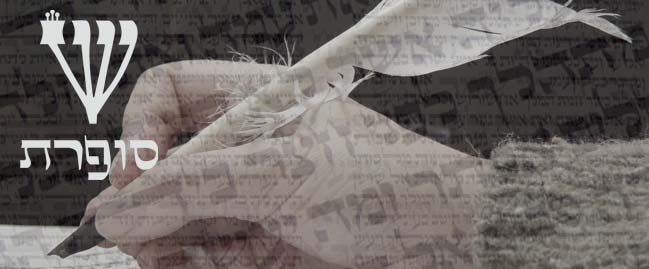BS"D
S-O-S!
I've had an extrememly eventful week. A week of endings & beginnings, a week of frusteration & joy, of learning & processing.
In preparation for writing the Sefer Torah, I began going through my Tiqun Shm'ot, the book that lays out exactly the way Sefer Sh'mot (the Book of Exodus) must be written. There are times when names of G@d are used to refer to idols or judges, etc, which represents a problem: When to meqadeysh (verbally sanctify) these names & when not to? ALL of G@d's names which appear in the Sefer - there are 10 - must be meqadeyshed. The Qeset HaSofer (Inkwell of the Sofer - the Sofer's rules book) states among its many rules that to err here & sanctify a name which refers to idols is equivalent to "urinating on the Holy of Holies". Oy.
A Tiqun relieves this fear of error by labelling each name "qodesh", holy, or "chol", regular. Now here's the problem:
As I was thumbing through parshat Sh'mot, circling all the qodesh names & putting squares around all the chol names, I came upon a name that was labelled "safeyq" - doubt.
Doubt? How can there be a doubt?
I read the sentence, Exodus 7:16, & it seemed quite clear that G@d was referring to G@d's-self. So why wasn't it qodesh? I e-mailed my Sofer for advice.
I continued my work. Reading pashat Va-era, methodically moving over the letters, it became a meditation for me. I noticed just how many times G@d declares, "Ani Ad@nai!" - "I am The Lord!". Were we not paying attention? Did we treat The Holy One inappropriately? G@d was so tangible, so present with us on our march through the desert, how could we forget that G@d was G@d?
Then again - a safeyq. Again G@d is talking about G@d's-self.
I e-mailed my Sofer again - "EMERGENCY!" in the subject line.
Still further. I see the word "Eloqey" in parshat Bo. It has neither "qodesh" nor "chol" written above it. Why not? Now I'm getting nervous. This Tiqun is a strict standard published in B'nai B'raq (a town so holy, they have no police force, because everyone is too afraid of G@d). If there's no indication, how do I know what to do? I read the pasuq (sentence). It was referring to "eloqey Mitzraim" - the gods of Egypt. So obviously the name is chol. But it isn't labelled, so if a Sofer does not notice, is not sufficiently conscious of the meaning of the full sentence, he could easily make a mistake. A mistake like that is very serious - it passuls (treyfs/makes unkosher) that whole yeri'ah (sheet) of qlaf (parchment). & it must be buried.
I'm waiting to hear back from my Sofer.
I wonder how many passul Sifrei Torah are out there right now...
Netivat Sofrut: diary of a Soferet
Adventures of a female sofer learning to heal the world by doing Holy Work...writing a Sefer Torah
נחזיר את השכינה למקומה בצייון ובתבל כלה
"Let us restore the Divine In-Dwelling to Her Place in Zion & infuse Her spirit throughout the whole inhabited world."
So wherever we are, let us bring the Peace of G@d's Presence.
About Me

- Name: Soferet
- Location: Vancouver/London, British Columbia/UK, Canada
SCRIBAL EVANGELIST As the only living certified Soferet (סופרת - female Jewish ritual scribe) & the first woman to practice sofrut (creation of sacred Hebrew texts) in over 200 years, I feel an obligation to blog about my experiences of The Work. I am also currently researching the foundation of a lost tradtion of women practicing this holy craft. For more on the services I provide, please see Soferet.com; Sofrut Nation. I am now available to engage with students, male or female, wishing to enter into the preliminary stage of learning sofrut. You are welcome to join me on this path. "Tzedeq, tzedeq tir'dof - Justice, justice you shall pursue." Devarim/Deuteronomy 16:20.
Community





Filmography
1. "Soferet: A Special Scribe" (2005)
2. Feature documentary on Jewish Renewal (2006) (post-production)
3. "Write for Yourselves" (2007) (post-production)
4. Documentary on Jewish Feminism (2008) (pre-production)

Frequently Asked Questions
- My web site
- My credentials
- What's my story?
- Appearances
- 10 FAQs
- Upcoming Events! (updated)
- Women and Sofrut
- My Take on Fame
- Buy the T-shirt!
- What do my students say?
- Free Mezuzah Check!
- Blog Policy
- MySpace Blog
- MySpace Profile
- Flickr Profile
- Shop for Sofrut?
www.flickr.com

More of soferet's photos
Pictures of my Work
Sofrut - ס×פר×ת - Sacred texts
- Megillat Esther Scroll column 1
- Esther Scroll columns 1 & 2
- Esther Scroll columns 3 & 4
- Esther Scroll column 17
- Esther Scroll column 17 & 18
- Mezuzah Scroll (back & front)
- Echad - G@d's Oneness
- Sefer Torah text
- Genesis to Exodus
- A Single Word
- Parshat Vayechi
Qame'ot ve-Segulot - ק××¢×ת ×ס××××ת - Amulets
- 3 Angels childbirth amulet
- Circle Birth amulet
- Meditation Shield
- Fire Amulet
- Tree of Life Star
- Hamsa Amulet
- Meforash Y-H-V-H
- Grid Amulet
- Creation Meditation Circle
Ketubot - ×ת×××ת - Wedding Contracts
- Cherry Tree Ketubah
- Cosmos Ketubah
- Persian Ketubah Border
- Bukharan
- Celtic Rings
- Twined Trees
- Planetary
Mezuzah Batim - Scroll Cases
- Shin Mezuzah Case
- Sh@dai Mezuzah Case
- Gold & Silver leafed Mezuzah Cases
Judaica - Jewish Art
- Alef
- B'reyshit - In the Beginning
- Outside B'reyshit
- Inside B'reyshit
- Hashkiveynu
- Rainbow
- Rosh Chodesh-New Moon
- Klingon Hebrew!
- Aishet Chayil
- Cursive Hebrew
- Avinu Malkeynu
- Shir Ha-Shirim/Song of Solomon
Israel
- B'nai B'rith Canada
- Canada-Israel Committee
- Canada-Israel Experience
- Canadian Jewish Congress
- Jewish Students Canada
- UIA FederationsCanada
 Feed – Subscribe to soferet's photos
Feed – Subscribe to soferet's photos
Blogroll
- A Jewish Soul
- Al Ha veDa ×¢× ×× ×××
- Another Country
- An Unsealed Room
- Bloghead
- Brainsite
- Byroniverse
- Chayyei Sarah
- Customerservant.com
- Danya Ruttenberg!
- Devarim
- Ecclesia Gnostica in Nova Albion
- Epichorus
- Heeb 'n' Vegan
- House of Joy
- In LA: to Life!
- Israelity
- Jerusalem Syndrome
- Jewlicious
- -=JeW*SCHooL=-
- JOFA Development
- Kosher Vancouver ModBlog
- Kadima
- Kaphtziel
- Kesher Talk
- Kisui Rosh
- Little Green Footballs
- Lulei Demistafina
- Matzat
- Mayim Rabim
- Mirty's Place: the journey & beyond
- Mis Dakdek
- Morey Altman
- Modern Orthodox Woman
- Mordechai Pinchas, Sofer
- Moshav HaAm
- Moving to Hawai'i
- Mystical Politics
- On the Fringe - Al Tzitzit
- On the Main Line
- Orthodox Anarchist
- Orthomom
- Picture My World
- Picture Shula!
- Pocket Change
- Quicksilver ×ספ×ת
- Renegade Rebbetzin
- Ruth's Megillah
- Seeking Grace
- SixThirteen
- Sofrut Nation
- The Kosher Blog
- The Rabbi's Kid
- Thoughts from a Rabbi
- Treppenwitz
- Urban Wild
- Velveteen Rabbi
- Wilderness Maggid
4 Non-Blogs
- Midreshet Berot bat Ayin
- Nishmat
- Pardes
- Yeshivat Simchat Shlomo
...plus one:
- Women's Sofrut Certification
Media Centre
- Jewish Women's Archive, week 40
Koleinu - Oct 97,
Jewish Western Bulletin â July 03/August 03/September 03,
Jewish Transcript â September 03,
Jewish Western Bulletin â October 10 03/October 17 03,
Moment Magazine - October 2003,
Jewish Western Bulletin â November 03/December 03,
The Globe And Mail â December 03,
Vancouver Indy Media â February 04,
Hadassah Magazine - May 04,
Lilith Magazine â Summer 04,
Jewish News Weekly of Northern California â February 05,
Jewish Telegraphic Agency â February 05,
Jewish Telegraph, UK â February 05,
Canadian Jewish News â July 05,
The Jewish Forward - June 05,
Jewish Journal of Greater Los Angeles - July 05,
Religious Tolerance Magazine - Oct 05,
The Jewish Independent - November 05,
Lilith Magazine â Autumn 05,
JOFA Magazine - Feb 06,
Hadassah Magazine - March 2006,
Jewish Virtual Library
The Jewish Review - July 06

My Sordid Past
- ISOLATION
- THE GLOBE AND MAIL
- LONG PATH TO BEING A TORAH SCRIBE
- MY CREDENTIALS
- B"H
DESOLATION
Wednesday, September 10th
As I ...
- B"H
SEWING THE SEEDS OF PTSD
Tuesday, September ...
- B"H
RESTLESSNESS
Monday, September 8th
I can't...
- B"H
FEAR & VULNERABILITY
Sunday, September 7th
...
- B"H
THANK G@D FOR MY SOFER!
Saturday, September ...
- A WORD OF WARNING TO BARCLAY
* All of the content of this web site, including text, photographs, etc & any other original work, is © copyrighted & all international rights reserved by A. Barclay, including the "soferet 4-branched shin logo" (TM). Want to license content from me? Just ask. I can be very reasonable. Especially if you pay me.
More blogs about
Torah, Judaism,
Israel & Feminism.

Tuesday, January 20, 2004
Hits Since March 2, 2005!

Free Counter
by Pliner.Net
dating,
lasik,
I only endorse the ads on this site which reflect a traditional Torah-centred life
<<
List
Jewish Bloggers
Join
>>
«
#
Pacific Northwest Blogs
?
»
 Jewish WebRing Exchange Member Site
Jewish WebRing Exchange Member Site
This site is owned by Avi'el T'shuvah bat Avraham lemishpachat Ben-Shadar
Want to join the Ring? Get Info here
[SkipPrev][Prev][Next][SkipNext][Random][Next5][ListSites]
[Support the Jewish Webring and visit our sponsor, Net Radio]
Site Feed
Community



Filmography
1. "Soferet: A Special Scribe" (2005)
2. Feature documentary on Jewish Renewal (2006) (post-production)
3. "Write for Yourselves" (2007) (post-production)
4. Documentary on Jewish Feminism (2008) (pre-production)

Frequently Asked Questions
- My web site
- My credentials
- What's my story?
- Appearances
- 10 FAQs
- Upcoming Events! (updated)
- Women and Sofrut
- My Take on Fame
- Buy the T-shirt!
- What do my students say?
- Free Mezuzah Check!
- Blog Policy
- MySpace Blog
- MySpace Profile
- Flickr Profile
- Shop for Sofrut?
- Megillat Esther Scroll column 1
- Esther Scroll columns 1 & 2
- Esther Scroll columns 3 & 4
- Esther Scroll column 17
- Esther Scroll column 17 & 18
- Mezuzah Scroll (back & front)
- Echad - G@d's Oneness
- Sefer Torah text
- Genesis to Exodus
- A Single Word
- Parshat Vayechi
Qame'ot ve-Segulot - ק××¢×ת ×ס××××ת - Amulets
- 3 Angels childbirth amulet
- Circle Birth amulet
- Meditation Shield
- Fire Amulet
- Tree of Life Star
- Hamsa Amulet
- Meforash Y-H-V-H
- Grid Amulet
- Creation Meditation Circle
Ketubot - ×ת×××ת - Wedding Contracts
- Cherry Tree Ketubah
- Cosmos Ketubah
- Persian Ketubah Border
- Bukharan
- Celtic Rings
- Twined Trees
- Planetary
Mezuzah Batim - Scroll Cases
- Shin Mezuzah Case
- Sh@dai Mezuzah Case
- Gold & Silver leafed Mezuzah Cases
Judaica - Jewish Art
- Alef
- B'reyshit - In the Beginning
- Outside B'reyshit
- Inside B'reyshit
- Hashkiveynu
- Rainbow
- Rosh Chodesh-New Moon
- Klingon Hebrew!
- Aishet Chayil
- Cursive Hebrew
- Avinu Malkeynu
- Shir Ha-Shirim/Song of Solomon
Israel
- B'nai B'rith Canada
- Canada-Israel Committee
- Canada-Israel Experience
- Canadian Jewish Congress
- Jewish Students Canada
- UIA FederationsCanada
 Feed – Subscribe to soferet's photos
Feed – Subscribe to soferet's photos
Blogroll
- A Jewish Soul
- Al Ha veDa ×¢× ×× ×××
- Another Country
- An Unsealed Room
- Bloghead
- Brainsite
- Byroniverse
- Chayyei Sarah
- Customerservant.com
- Danya Ruttenberg!
- Devarim
- Ecclesia Gnostica in Nova Albion
- Epichorus
- Heeb 'n' Vegan
- House of Joy
- In LA: to Life!
- Israelity
- Jerusalem Syndrome
- Jewlicious
- -=JeW*SCHooL=-
- JOFA Development
- Kosher Vancouver ModBlog
- Kadima
- Kaphtziel
- Kesher Talk
- Kisui Rosh
- Little Green Footballs
- Lulei Demistafina
- Matzat
- Mayim Rabim
- Mirty's Place: the journey & beyond
- Mis Dakdek
- Morey Altman
- Modern Orthodox Woman
- Mordechai Pinchas, Sofer
- Moshav HaAm
- Moving to Hawai'i
- Mystical Politics
- On the Fringe - Al Tzitzit
- On the Main Line
- Orthodox Anarchist
- Orthomom
- Picture My World
- Picture Shula!
- Pocket Change
- Quicksilver ×ספ×ת
- Renegade Rebbetzin
- Ruth's Megillah
- Seeking Grace
- SixThirteen
- Sofrut Nation
- The Kosher Blog
- The Rabbi's Kid
- Thoughts from a Rabbi
- Treppenwitz
- Urban Wild
- Velveteen Rabbi
- Wilderness Maggid
4 Non-Blogs
- Midreshet Berot bat Ayin
- Nishmat
- Pardes
- Yeshivat Simchat Shlomo
...plus one:- Women's Sofrut Certification
Media Centre
- Jewish Women's Archive, week 40
Koleinu - Oct 97, Jewish Western Bulletin â July 03/August 03/September 03, Jewish Transcript â September 03, Jewish Western Bulletin â October 10 03/October 17 03, Moment Magazine - October 2003, Jewish Western Bulletin â November 03/December 03, The Globe And Mail â December 03, Vancouver Indy Media â February 04, Hadassah Magazine - May 04, Lilith Magazine â Summer 04, Jewish News Weekly of Northern California â February 05, Jewish Telegraphic Agency â February 05, Jewish Telegraph, UK â February 05, Canadian Jewish News â July 05, The Jewish Forward - June 05, Jewish Journal of Greater Los Angeles - July 05, Religious Tolerance Magazine - Oct 05, The Jewish Independent - November 05, Lilith Magazine â Autumn 05, JOFA Magazine - Feb 06, Hadassah Magazine - March 2006, Jewish Virtual Library The Jewish Review - July 06
My Sordid Past
- ISOLATION
- THE GLOBE AND MAIL
- LONG PATH TO BEING A TORAH SCRIBE
- MY CREDENTIALS
- B"H DESOLATION Wednesday, September 10th As I ...
- B"H SEWING THE SEEDS OF PTSD Tuesday, September ...
- B"H RESTLESSNESS Monday, September 8th I can't...
- B"H FEAR & VULNERABILITY Sunday, September 7th ...
- B"H THANK G@D FOR MY SOFER! Saturday, September ...
- A WORD OF WARNING TO BARCLAY
* All of the content of this web site, including text, photographs, etc & any other original work, is © copyrighted & all international rights reserved by A. Barclay, including the "soferet 4-branched shin logo" (TM). Want to license content from me? Just ask. I can be very reasonable. Especially if you pay me.
More blogs about
Torah, Judaism,
Israel & Feminism.
Tuesday, January 20, 2004
www.flickr.com
|
Pictures of my Work
Sofrut - ס×פר×ת - Sacred texts
Hits Since March 2, 2005!
I only endorse the ads on this site which reflect a traditional Torah-centred life
Free Counter
by Pliner.Net
dating,
lasik,
Jewish Bloggers
Join
>>
 Jewish WebRing Exchange Member Site
Jewish WebRing Exchange Member Site
This site is owned by Avi'el T'shuvah bat Avraham lemishpachat Ben-Shadar
Want to join the Ring? Get Info here [SkipPrev][Prev][Next][SkipNext][Random][Next5][ListSites]
[Support the Jewish Webring and visit our sponsor, Net Radio]








0 Comments:
Post a Comment
<< Home